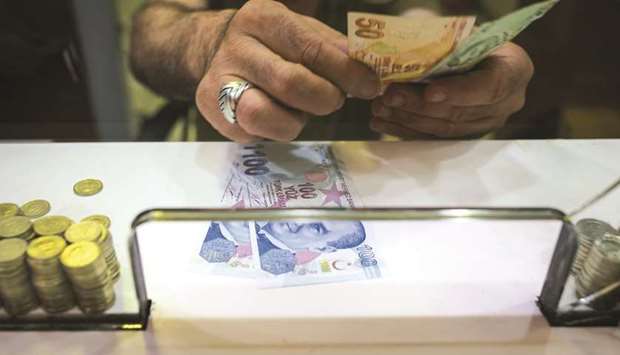The plan will seek to mitigate the need for capital injections and propose carving out non-performing loans for transfer to a state-designated entity, said the people, who asked not to be named because the deliberations are confidential. The measures are likely to be announced on Thursday, one of the people said.
Shares of Turkish banks rallied on the news. Turkish lenders have been struggling to deal with a rising number of restructurings after the lira dropped about 40% against the dollar this year, matching the Argentine peso as the world’s worst-performing currency and hurting firms’ ability to repay foreign-currency loans. The energy industry alone owes $51bn to the nation’s banks.
“The creation of a so-called bad bank to absorb all of the debts, which are bound to start non-performing, may dilute some of the risks associated with the Turkish banking sector,” said Julian Rimmer, a trader at Investec Bank Plc in London. “But the subsequent lack of transparency will concern bond investors and there is no way of avoiding a general decline in Turkey’s overall creditworthiness, no matter where you park the NPLs.”
The new measures were discussed in a series of meetings between bank executives and senior government officials last week, according to one of the people. On Thursday, Treasury and Finance Minister Berat Albayrak is expected to announce a medium-term economic programme with fiscal and macroeconomic targets for the next three years, and the help for banks will likely be unveiled then, the person said.
The Borsa Istanbul Banks Index pared losses from as much as 2.6% to a 1.8% decline as of 2.17pm in Istanbul.
About half of Turkey’s non-financial companies’ total liabilities of $331bn at end-June is with banks based in Turkey, according to central bank data. The ratio doubled from 2008.
The Treasury and Finance Ministry didn’t immediately comment on the plan when reached by Bloomberg.
“Steps will be taken toward liquidity in banks,” Dunya newspaper cited Albayrak as saying on Friday. “Now, we are waiting for banks to take steps toward the manufacturing industry and this approach should be on a win-win basis.”
The lira’s losses in August were triggered by US sanctions over the detention of an American pastor, and accelerated when US President Donald Trump imposed tariffs on some of the nation’s imports.
Last week, the central bank jacked up rates to 24%, more than expected, though the currency is still trading below where it was in July.

